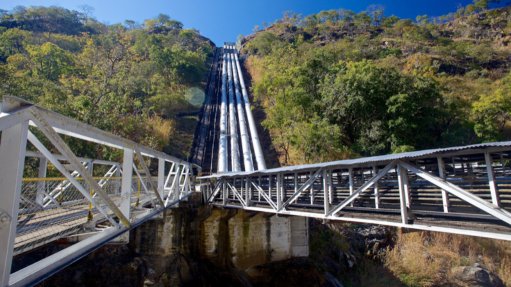On-The-Air (03/12/2021)
Every Friday, SAfm’s radio anchor Sakina Kamwendo speaks to Martin Creamer, publishing editor of Engineering News & Mining Weekly. Reported here is this Friday’s At the Coalface transcript:
Kamwendo: A blueprint to combat climate change has been proposed by South Africa’s leading mining company.
Creamer: They say the sun is everywhere, the wind is everywhere. These mines have even got water from which they can generate electricity. There are big discussions now about what they are going to do to decarbonise.
Anglo American took part in a major international discussion, in which a United Nations representative also took part. Anglo put through a blueprint which can be followed by other mining companies. That is, you first use renewable energy to cut carbon that would be emitted if coal were burnt, then you use the renewable energy to generate hydrogen, then you use that hydrogen to replace the diesel. This is the proposal they are putting forward. It is not just words, because this is actually happening now in Limpopo Province, as we speak.
It is in Limpopo that Anglo is doing exactly that. The diesel that normally runs those big trucks that they have got there will be replaced by green hydrogen. When we say green hydrogen, it means there is no emission whatsoever, so you are actually combatting climate change in the most exact format. Hopefully other mining companies will follow suit. It seems the route to take and there is no excuse for these mining companies not to do it. If they don't, you can see the international investors are saying that they will withdraw investments from their companies.
Kamwendo: South Deep gold mine is now planning 50 MW of sun energy with an equal volume of wind energy.
Creamer: When this mine, which is on the West Rand, a very big gold mine and it will still be going to be there in 75 years’ time. It is a really big mine and a mechanised mine. They were needing to generate their own electricity both from a point of view of cutting carbon, but also cutting their costs. Then they spoke of 40 MW and they started constructing it.
If you go out there now, construction is under way. In between, the efficiency of the solar panels that are bring used has increased, so that by the time they arrive there in January, South Deep gold mine will benefit an extra 10 MW, so it will go to 50 MW of solar power when they were really only bargaining on 40 MW. At the same price they get 50 MW. They are now also contemplating an equal megawattage in wind power, so we can see that it is a business case.
The price of electricity is high, the shareholders are down on them for producing carbon, so they don’t want to buy electricity which requires coal having to be burnt. They are generating clean electricity themselves, but it is a business case and is costing them hundreds of millions of rands less to actually generate their own electricity and it is also decarbonising our atmosphere. So everything is a win-win.
Kamwendo: Glencore this week promised to institute just transition measures at all the coal mines that it closes down.
Creamer: Yes, Glencore has got a lot of coal mines in South Africa, but they have coal mines around the world. They have already closed one coal mine in Colombia, in South America, and they are going to close three more next year and the following year in Australia. What they are promising is that when they close these mines, they will engage in a just transition, which means that the communities will be looked after, the employees will be looked after ,and Mother Earth will be looked after.
They are also contemplating generating their renewable energy. We see that they are talking about renewable energy in many places, again because it is a business case, not only in South Africa but also elsewhere in the world. They are saying that they also take the rehabilitation of their mines seriously and they are already growing winter wheat in South Africa on a mine property. That is the sort of measure they will take. They will make sure that when they leave, they leave the place in a better situation that it was, with sustainable activity for the community and also employees looked after. The burning of coal has become a burning issue and the world does not want it.
They have to start thinking of closing their coal mines. They’re committed to producing 15% less coal by 2026, which is pretty close, and then 30% by 2035, and then exiting by 2050. So coal is being cold shouldered but they want to close their mines in a responsible way, to make sure the community and employees are looked after during the withdrawal process.
Kamwendo: Thanks very much. Martin Creamer is publishing editor of Engineering News and Mining Weekly.
Article Enquiry
Email Article
Save Article
Feedback
To advertise email advertising@creamermedia.co.za or click here
Press Office
Announcements
What's On
Subscribe to improve your user experience...
Option 1 (equivalent of R125 a month):
Receive a weekly copy of Creamer Media's Engineering News & Mining Weekly magazine
(print copy for those in South Africa and e-magazine for those outside of South Africa)
Receive daily email newsletters
Access to full search results
Access archive of magazine back copies
Access to Projects in Progress
Access to ONE Research Report of your choice in PDF format
Option 2 (equivalent of R375 a month):
All benefits from Option 1
PLUS
Access to Creamer Media's Research Channel Africa for ALL Research Reports, in PDF format, on various industrial and mining sectors
including Electricity; Water; Energy Transition; Hydrogen; Roads, Rail and Ports; Coal; Gold; Platinum; Battery Metals; etc.
Already a subscriber?
Forgotten your password?
Receive weekly copy of Creamer Media's Engineering News & Mining Weekly magazine (print copy for those in South Africa and e-magazine for those outside of South Africa)
➕
Recieve daily email newsletters
➕
Access to full search results
➕
Access archive of magazine back copies
➕
Access to Projects in Progress
➕
Access to ONE Research Report of your choice in PDF format
RESEARCH CHANNEL AFRICA
R4500 (equivalent of R375 a month)
SUBSCRIBEAll benefits from Option 1
➕
Access to Creamer Media's Research Channel Africa for ALL Research Reports on various industrial and mining sectors, in PDF format, including on:
Electricity
➕
Water
➕
Energy Transition
➕
Hydrogen
➕
Roads, Rail and Ports
➕
Coal
➕
Gold
➕
Platinum
➕
Battery Metals
➕
etc.
Receive all benefits from Option 1 or Option 2 delivered to numerous people at your company
➕
Multiple User names and Passwords for simultaneous log-ins
➕
Intranet integration access to all in your organisation


















